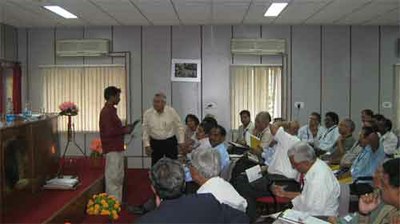Understanding the Backyard Poultry Sector: Shifting the Focus to a “Livelihoods Approach”
Jul 27, 2009
A National Workshop on “Synthesizing Experiences in Promotion of Backyard Poultry”, was jointly organized by WASSAN, Project Directorate of Poultry (PDP), SA PPLPP, Rainfed Livestock Network (FES) in Hyderabad on 9-10 July 2009, with an objective of sharing field experiences in promoting Back Yard Poultry and identifying the major areas of concern and future course of action.
The workshop consisted of a blend of participants from Research Institutes, Veterinary Universities, Government Institutions, Animal Husbandry Departments (AHD), NGOs, and the Commercial sector. They shared their experiences of Backyard poultry sector with Desi and improved birds. An overview of Good Practices documented by SA PPLPP in the small scale poultry production in South Asia was presented along with the lessons learnt. On going research and that which needs to be taken up in Backyard Poultry sector was also shared during the workshop.
While identifying the issues for policy advocacy and further research, it was brough out and reiterated that the main constraints faced by Backyard poultry keepers are - high mortality due to preventable diseases, lack of knowledge of management practices that could enhance livelihoods, poor or no access to primary health services, failure of preventive vaccination due to non-availability or breakdown of cold chain, unavailability of quality chicks in areas not covered by commercial hatcheries. It was also suggested that the PPP mode could be the answer in reaching DOC while NGO-Public convergence could provide health services to poultry keepers.
Anthra’s work on in-situ conservation with active community participation and multi pronged efforts to increase poultry population through improved management practices including feed and health services was well received by the participants. It was brought to the notice of the house that ad-hoc introduction of improved breeds in home tracts of indigenous breeds would be detrimental to the gene pool and should not be recommended.
 NGO’s shared their recent experiences on the changes in the livelihood pattern of beneficiaries with the introduction of improved birds. Too much emphasis was made on the different improved birds by the institutions that had bred these birds. Although the improved birds provided food security and enhanced income of the rural households, Desi bird should not be overlooked. It was pointed out that the role of the Desi poultry as an auto generating bird with qualities of scavenging makes it a strong contender for Backyard poultry keeping. Any plan to replace the Desi stock with ‘Improved birds’ should be carefully deliberated upon before implementing as it is not just the productivity of the bird that matters but also the role it plays in socio-cultural fabric of the community. Any gradual replacement of Desi by the improved breeds will not only lead to the rearers becoming dependent on the Government/NGO/Private supplier for the fresh stock of chicks, it could lead to an unavoidable monopolistic hold. Although the thought of enhancing livelihoods and food security of Backyard poultry farmers may be a noble one, but the resultant depletion of the Desi stock needs to be given due consideration.
NGO’s shared their recent experiences on the changes in the livelihood pattern of beneficiaries with the introduction of improved birds. Too much emphasis was made on the different improved birds by the institutions that had bred these birds. Although the improved birds provided food security and enhanced income of the rural households, Desi bird should not be overlooked. It was pointed out that the role of the Desi poultry as an auto generating bird with qualities of scavenging makes it a strong contender for Backyard poultry keeping. Any plan to replace the Desi stock with ‘Improved birds’ should be carefully deliberated upon before implementing as it is not just the productivity of the bird that matters but also the role it plays in socio-cultural fabric of the community. Any gradual replacement of Desi by the improved breeds will not only lead to the rearers becoming dependent on the Government/NGO/Private supplier for the fresh stock of chicks, it could lead to an unavoidable monopolistic hold. Although the thought of enhancing livelihoods and food security of Backyard poultry farmers may be a noble one, but the resultant depletion of the Desi stock needs to be given due consideration.
The organized commercial sector was represented by Yashwant Agro-tech Pvt Ltd and INDBRO Research and Breeding Farm among others. The participants realized that comparison between Desi, Improved and Broiler based on Feed conversion ratio (FCR) can be misleading since Desi is a scavenging bird and there in lies its strength. The discussion amongst the participants raised concerns on whether the backyard poultry system followed by poor and their perceptions/requirements is clearly understood by research scientists and policy makers.
PRADAN’s model of tapping into Broiler farming through rural women by building institutions and providing support at all levels in Jharkhand was much appreciated as it has managed to impact the community through concerted effort and commitment over a long period of time.
Access to Primary health care services and its delivery were the key issues brought out by BILDP programme Chhattisgarh, Poultry production in Kerala (DANIDA)- These reflected upon community based animal health workers role in mitigating diseases while also providing self employment. The support from NGOs/Animal Husbandry Department in form of training, refresher course, sourcing of medicine/vaccines etc, is crucial for its success.
This sector has been neglected for a long time and needs the due attention of policy makers, since it impacts the livelihoods of millions of small holder poultry farmers.
Contributed by - SA PPLPP Coordination Team









